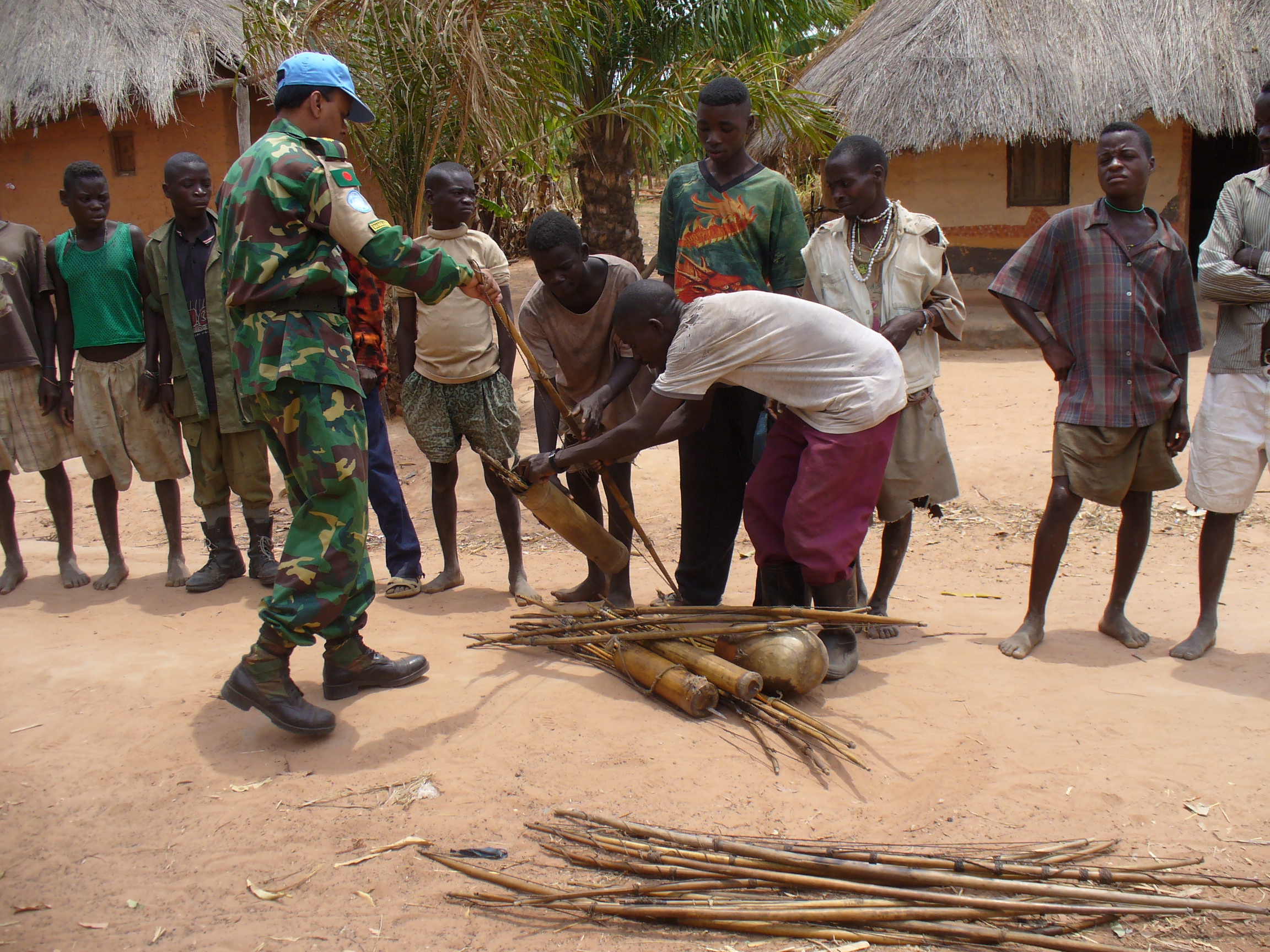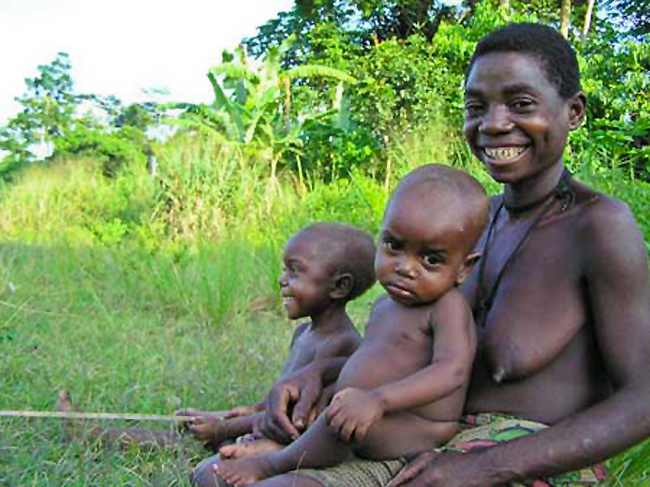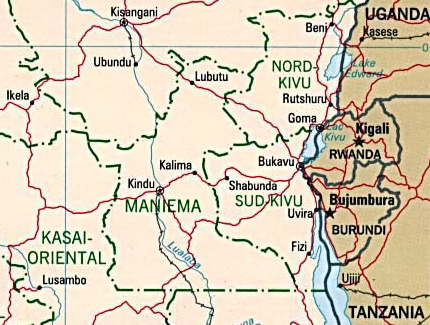|
Mai Mai
The term Mai-Mai or Mayi-Mayi refers to any kind of community-based militia group active in the Democratic Republic of the Congo (DRC) that is formed to defend local communities and territory against other armed groups. Most were formed to resist the invasion of Rwandan forces and Rwanda-affiliated Congolese rebel groups, but some may have formed to exploit the war to their own advantage by looting, cattle rustling or banditry. Groups that fall under the umbrella term "Mai-Mai" include armed forces led by warlords, traditional tribal elders, village heads and politically motivated resistance fighters. Because Mai Mai have only the most tenuous internal cohesion, different Mai-Mai groups allied themselves with a variety of domestic and foreign government and guerrilla groups at different times. The term Mai-Mai refers not to any particular movement, affiliation or political objective but to a broad variety of groups. The name comes from the Swahili word for water, "maji". Mili ... [...More Info...] [...Related Items...] OR: [Wikipedia] [Google] [Baidu] |
Mau-Mau Uprising
The Mau Mau rebellion (1952–1960), also known as the Mau Mau uprising, Mau Mau revolt or Kenya Emergency, was a war in the British Kenya Colony (1920–1963) between the Kenya Land and Freedom Army (KLFA), also known as the ''Mau Mau'', and the British authorities. Dominated by the Kikuyu people, Meru people and Embu people, the KLFA also comprised units of Kamba people, Kamba and Maasai people, Maasai peoples who fought against the white European colonist-settlers in Kenya, the British Army, and the local Kenya Regiment (British colonists, local auxiliary militia, and pro-British Kikuyu people). The capture of rebel leader Field Marshal Dedan Kimathi on 21 October 1956 signalled the defeat of the Mau Mau, and essentially ended the British military campaign. However, the rebellion survived until after Kenya's independence from Britain, driven mainly by the Meru people, Meru units led by Field Marshal Musa Mwariama and General Baimungi. Baimungi, one of the last Mau Mau gen ... [...More Info...] [...Related Items...] OR: [Wikipedia] [Google] [Baidu] |
Batembo
In anthropology, pygmy peoples are ethnic groups whose average height is unusually short. The term pygmyism is used to describe the phenotype of endemic short stature (as opposed to disproportionate dwarfism occurring in isolated cases in a population) for populations in which adult men are on average less than tall. The term is primarily associated with the African Pygmies, the hunter-gatherers of the Congo Basin (comprising the Bambenga, Bambuti and Batwa). The terms "Asiatic Pygmies" and "Oceanian pygmies" have been used to describe the Negrito populations of Southeast Asia and Australo-Melanesian peoples of short stature. The Taron people of Myanmar are an exceptional case of a "pygmy" population of East Asian phenotype. Etymology The term ''pygmy'', as used to refer to diminutive people, derives from Greek πυγμαῖος ''pygmaios'' via Latin ''Pygmaei'' (sing. ''Pygmaeus''), derived from πυγμή – meaning a short forearm cubit, or a measure of length corres ... [...More Info...] [...Related Items...] OR: [Wikipedia] [Google] [Baidu] |
Uvira
Uvira is a city in the South Kivu Province of the Democratic Republic of Congo. Uvira is a Roman Catholic diocese, a suffragan of the archdiocese of Bukavu. Geography It is located at the extreme north end of Lake Tanganyika. Kalundu is a lake port at the southern end of the town, which provides links by boat to Kalemie in Katanga Province, Kigoma in Tanzania, Pulungu in Zambia and Bujumbura (the largest city and former capital of Burundi). The town is linked by road to Bukavu (the capital of the South Kivu province), and Bujumbura. The town is 120 km from Bukavu and 60 km from the territory of Fizi. Uvira is also linked by road to: * Bujumbura, the former capital of Burundi (25 km) * The territory of Fizi (60 km) * Rwanda via Kamanyola border (80 km) * Bukavu, the capital of the South Kivu province (120 km) * Kalemie in Katanga Province (385 km) Uvira Mental Health Center will serve primarily residents in territory of Uvira, territory of ... [...More Info...] [...Related Items...] OR: [Wikipedia] [Google] [Baidu] |
Lake Kivu
Lake Kivu is one of the African Great Lakes. It lies on the border between the Democratic Republic of the Congo and Rwanda, and is in the Albertine Rift, the western branch of the East African Rift. Lake Kivu empties into the Ruzizi River, which flows southwards into Lake Tanganyika. Geography Lake Kivu is approximately long and at its widest. Its irregular shape makes measuring its precise surface area difficult; it has been estimated to cover a total surface area of some , making it Africa's eighth largest lake. The surface of the lake sits at a height of above sea level. This lake has a chance of suffering a limnic eruption every 1000 years. The lake has a maximum depth of and a mean depth of , making it the world's eighteenth deepest lake by maximum depth, and the ninth deepest by mean depth. Some or 58 percent of the lake's waters lie within DRC borders. The lake bed sits upon a rift valley that is slowly being pulled apart, causing volcanic activity in the area. Th ... [...More Info...] [...Related Items...] OR: [Wikipedia] [Google] [Baidu] |
Bunyakiri
Bunyakiri is a town in Kalehe Territory, South Kivu, Democratic Republic of the Congo The Democratic Republic of the Congo (french: République démocratique du Congo (RDC), colloquially "La RDC" ), informally Congo-Kinshasa, DR Congo, the DRC, the DROC, or the Congo, and formerly and also colloquially Zaire, is a country in ....It is mainly inhabited by Tembo,Havu, Twa and Hunde ethnic groups. People live mainly by doing agriculture and Fishery here. Others are skilled Hunters. References Populated places in South Kivu {{DRCongo-geo-stub ... [...More Info...] [...Related Items...] OR: [Wikipedia] [Google] [Baidu] |
Walungu
Walungu is a territory of South Kivu in the Democratic Republic of Congo It was the site of a plane crash on May 25, 2005 when a chartered Maniema Union Antonov An-28 aircraft, owned by Victoria Air, crashed into a mountain near Walungu, about 30 minutes after takeoff. All of the 22 passengers and 5 crew members were killed (see 2005 in aviation This is a list of aviation-related events from 2005: Events * The Dutch Transport Safety Board merges with Dutch military accident investigation authorities to for the Dutch Safety Board, which takes over the responsibility for aviation accid ...). Walungu Territory comprises a number of Groupments and Chefferie' notably Burhale Groupment, Ihembe Groupment, Mushinga Groupment and many more. UN Peacekeeping Force has also been employed to counter foreign armed groups and local militias which are committing HRVs (Human Rights Violations) while exploring minerals from the area. References External links * http://www.afriline.net/aid ... [...More Info...] [...Related Items...] OR: [Wikipedia] [Google] [Baidu] |
Front De Résistance Et De Défense Du Kivu
Front may refer to: Arts, entertainment, and media Films * ''The Front'' (1943 film), a 1943 Soviet drama film * ''The Front'', 1976 film Music *The Front (band), an American rock band signed to Columbia Records and active in the 1980s and early 1990s *The Front (Canadian band), a Canadian studio band from the 1980s Periodicals * ''Front'' (magazine), a British men's magazine * '' Front Illustrated Paper'', a publication of the Yugoslav People's Army Television * Front TV, a Toronto broadcast design and branding firm * "The Front" (''The Blacklist''), a 2014 episode of the TV series ''The Blacklist'' * "The Front" (''The Simpsons''), a 1993 episode of the TV series ''The Simpsons'' Military * Front (military), a geographical area where armies are engaged in conflict * Front (military formation), roughly, an army group, especially in eastern Europe Places * Front, California, former name of Brown, California * Front, Piedmont, an Italian municipality * The Front, now part ... [...More Info...] [...Related Items...] OR: [Wikipedia] [Google] [Baidu] |
Mai-Mai Yakutumba
The term Mai-Mai or Mayi-Mayi refers to any kind of community-based militia group active in the Democratic Republic of the Congo (DRC) that is formed to defend local communities and territory against other armed groups. Most were formed to resist the invasion of Rwandan forces and Rwanda-affiliated Congolese rebel groups, but some may have formed to exploit the war to their own advantage by looting, cattle rustling or banditry. Groups that fall under the umbrella term "Mai-Mai" include armed forces led by warlords, traditional tribal elders, village heads and politically motivated resistance fighters. Because Mai Mai have only the most tenuous internal cohesion, different Mai-Mai groups allied themselves with a variety of domestic and foreign government and guerrilla groups at different times. The term Mai-Mai refers not to any particular movement, affiliation or political objective but to a broad variety of groups. The name comes from the Swahili word for water, "maji". Militi ... [...More Info...] [...Related Items...] OR: [Wikipedia] [Google] [Baidu] |



.jpg)

